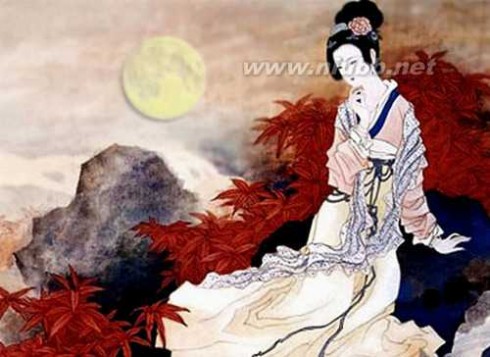一 : 关于元宵节的诗歌
篇一:《元夕于通衢建灯夜升南楼》二 : 关于元宵节的诗
关于元宵节的诗(一)
《生查子 元夕 》
(宋)欧阳修
去年元夜时,花市灯如昼。
月到柳梢头,人约黄昏后。
今年元夜时,月与灯依旧。
不见去年人,泪湿春衫袖。
《京都元夕》
(元)元好问
袨服华妆着处逢 ,六街灯火闹儿童 。
长衫我亦何为者 ,也在游人笑语中 。
折桂令 元宵
(元)失名
爱元宵三五风光,月色婵娟,灯火辉煌。
月满冰轮,灯烧陆海,人踏春阳。
三美事方堪胜赏,四无情可恨难长。
怕的是灯暗光芒,人静荒凉,角品南楼,月下西厢。
《汴京元夕》
(明)李梦阳
中山孺子倚新妆,郑女燕姬独擅场。
齐唱宪王春乐府, 金梁桥外月如霜。
《元 宵》
(明) 唐寅
有灯无月不娱人,有月无灯不算春。
春到人间人似玉, 灯烧月下月如银。
满街珠翠游村女,沸地笙歌赛社神。
不展芳尊开口笑,如何消得此良辰。
《元夜踏灯》
(清)董舜民
百枝火树千金屧,宝马香尘不绝。飞琼结伴试灯来,忍把檀郎轻别。
一回佯怒,一回微笑,小婢扶行怯。
石桥路滑缃钓蹑,向阿母低低说。妲娥此夜悔还无?怕入广寒宫阙。
不如归去,难畴畴昔,总是团圆月。
关于元宵节的诗(二)
《十五夜观灯》
(唐)卢照邻
锦里开芳宴,兰红艳早年。
缛彩遥分地,繁光远缀天。
接汉疑星落,依楼似月悬。
别有千金笑,来映九枝前。
正月十五夜灯
(唐)张祜
千门开锁万灯明,正月中旬动地京。
三百内人连袖舞 ,一进天上著词声。
诗曰
(唐)李商隐
月色灯山满帝都,香车宝盖隘通衢。
身闲不睹中兴盛, 羞逐乡人赛紫姑。
诗曰
(宋)姜白石
元宵争看采莲船,宝马香车拾坠钿;
风雨夜深人散尽,孤灯犹唤卖汤元。
诗曰
(宋)姜白石
贵客钩帘看御街,市中珍品一时来,
帘前花架无行路,不得金钱不肯回。
(注:珍品这里指元宵)
《青玉案 元夕》
(宋)辛弃疾
东风夜放花千树,更吹落,星如雨。
宝马雕车香满路,凤萧声动,壶光转,一夜鱼龙舞 。
蛾儿雪柳黄金缕,笑语盈盈暗香去。
众里寻他千百度,蓦然回首, 那人却在,火阑珊处。
三 : 关于元宵节的两个美丽传说

Lantern Festival falls on the fifteenth day of the first lunar month. This is the first full moon of the new year, symbolizing unity and perfection. Lantern Festival is an important part of Spring Festival , and marks the official end of the long holiday.
元宵节是农历正月的第十五天,这是新年的第一次满月,象征着和睦和团圆。(www.61k.com)元宵节是春节的一个重要组成部分,也象征着春节长假的正式结束。
There are many legends concerning the origins of Lantern Festival.
关于元宵节的来历有很多传说。
According to one legend, once in ancient times, a celestial swan came into the mortal world where it was shot down by a hunter. The Jade Emperor, the highest god in Heaven, vowed to avenge the swan. He started making plans to send a troop of celestial soldiers and generals to Earth on the fifteenth day of the first lunar month, with orders toincinerate all humans and animals. But the other celestial beings disagreed with this course of action, and risked their lives to warn the people of Earth. As a result, before and after the fifteenth day of the first month, every family hung red lanterns outside their doors and set off firecrackers and fireworks, giving the impression that their homes were already burning. By successfully tricking the Jade Emperor in this way, humanity was saved from extermination.
有一个传说是这样的,在古代,有一位神界天鹅闯入人间被猎手误杀。天界最高的神玉皇大帝因此发誓为这只天鹅报仇。他开始制定计划,派出一支天兵天将于农历正月十五来到人间,命令他们火烧所有的人和动物。但是其他神仙并不赞同这一计划,他们冒着生命危险提醒人间的人们。结果,在正月十五这一天前后,每一个家庭在门外挂起灯笼,并燃放烟花爆竹,给天兵天将造成各家各户起火的假象。通过这种方式,人们成功骗过了玉皇大帝,人类也因此逃过灭绝的危险。
According to another legend, during the time of Emperor Han Wudi of the Han Dynasty , a palace woman named Yuanxiao was prevented from carrying out her filial duty of visiting her parents on the fifteenth day of the first lunar month. Distraught, she said she would kill herself by jumping into a well. In order to help Yuanxiao fulfill her duty as a filialdaughter, the scholar Dongfang Shuo came up with a scheme. He told Emperor Han Wudi that the Jade Emperor, the highest god in Heaven, had ordered the Fire God to burn down the capital city of Chang’an on the sixteenth day of the first lunar month. Anxious to find a way to save his city, the emperor asked Dongfang Shuo what he should do. Dongfang Shuo replied that the Fire God loved red lanterns more than anything. He advised that the streets be hung with red lanterns, and the emperor, empress,concubines, and court officials come out of the palace to see them. In this way, the Fire God would be distracted and disaster averted. The emperor followed Dongfang Shuo’s advice, and while everyone was out viewing the lanterns, Yuanxiao was able to sneak out of the palace and be reunited with her parents.
另外一个传说发生在汉武帝时期。一位名叫元宵的宫女因身处深宫,没法在正月十五与父母团聚尽孝。为此,她欲跳井自尽。为了帮助元宵姑娘为父母尽孝,智者东方朔想出了一个计划。他告诉汉武帝,天界最高的神——玉皇大帝下令在正月十六火烧长安都。为了拯救长安城,汉武帝问东方朔该怎么办。东方朔回答说火神最爱大红灯笼。他建议在街道上悬挂大红灯笼,皇帝、皇后、六宫嫔妃和朝廷大臣都要外出观赏灯笼。这样,火神的注意力就会被分散,灾难也就可以避免了。皇帝采纳了东方朔的建议,当所有人都外出赏灯时,元宵得以有机会溜出皇宫,和家人团圆。
Although the above stories are quite fantastical, it is sure that the origins of Lantern Festival are related to ancient humanity’s use of fire to celebrate festivals and avert disaster. Since Lantern Festival involves making offerings to the deities and is celebrated at night, it is natural that fire would play an important role. Over time, Lantern Festival gradually evolved into its present form. When Buddhism was introduced to China during the Eastern Han Dynasty , the emperor decreed that on the night of the full moon of the first lunar month, lanterns should be lit to honor Buddha, adding yet another level of significance to Lantern Festival. And according to Daoism, Lantern Festival is associated with the primordial deities of Heaven and Fire, who were born on the fifteenth day of the first lunar month.
虽然上述的传说很神奇,但可以确定的是元宵节的起源必定跟古代人们使用火来庆祝节日、躲避灾难有关。元宵节活动包括逃避邪神,且是在晚上庆祝,所以很自然地,火就扮演了很重要的角色。随着时间的流逝,元宵节逐渐演变为今天的形式。东汉时期,佛教传入中国,皇帝下令,在正月第一个满月的晚上,必须点亮灯笼敬佛,这也使元宵节更增添了一份意义。而在道教里,元宵节是与掌管天界和火的元神紧密相连的,因为他们就诞生在正月十五。
Eating yuanxiao (sweet dumplings made with glutinous rice flour) is one of the special traditions of Lantern Festival. Lantern Festival is also called Yuanxiao Festival. Another name for yuanxiao is tangyuan, which literally means "boiled spheres."
吃元宵(由糯米粉制成的甜馅儿食物)是元宵节一个特别传统,而元宵节也因这种食物得名。元宵的另一种叫法是汤圆,字面意思就是“煮熟的圆球状食品”。
用微信学英语,让学习英语成为一种习惯。
微信号:daily-english,或按账号查找:每日学英语。
订阅后,可以在线查词、翻译、学习精彩英语短句、搜索海量英语学习资料。
本文标题:关于元宵节的诗-关于元宵节的诗歌61阅读| 精彩专题| 最新文章| 热门文章| 苏ICP备13036349号-1